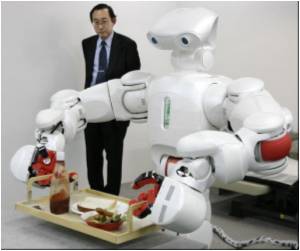Two Indian researchers have helped develop a robot, which offers a helping hand to humans by anticipating their action. The researchers are from Cornell's Personal Robotics Lab.

Gazing intently with a Microsoft Kinect 3-D camera and using a database of 3D videos, the Cornell robot identifies the activities it sees, considers what uses are possible with the objects in the scene and determines how those uses fit with the activities.
The robot then generates a set of possible continuations into the future - such as eating, drinking, cleaning, putting away - and finally chooses the most probable.
As the action continues, the robot constantly updates and refines its predictions.
"We extract the general principles of how people behave," said Ashutosh Saxena, Cornell professor of computer science and co-author of a new study tied to the research.
"Drinking coffee is a big activity, but there are several parts to it," he said.
Advertisement
Saxena will join Cornell graduate student Hema S. Koppula as they present their research at the International Conference of Machine Learning, June 18-21 in Atlanta, and the Robotics: Science and Systems conference June 24-28 in Berlin, Germany.
Advertisement
Source-ANI








